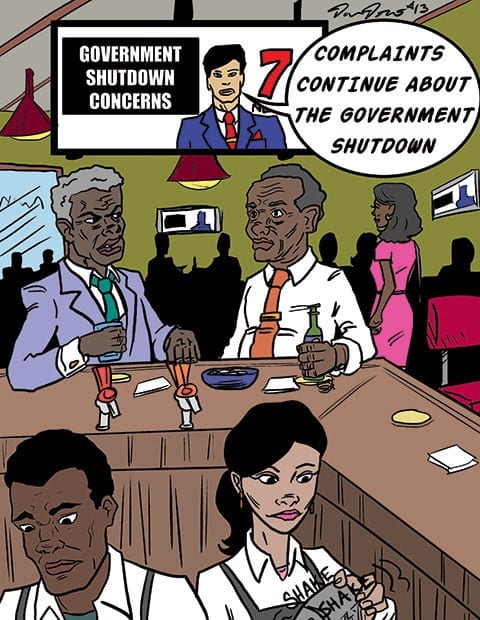
Throughout the years, African Americans have proven to be true patriots. Despite the history of racial discrimination against them, their faith in the democratic principles of this country has sustained them. Now the circumstances that have led to the shutdown of the government raise profound questions about the survival of that democracy.
When the United States was established in the 18th century, most governments were run by kings or queens. The notion of a republic with a broad division of powers was novel back then. Not only would the people elect U.S. senators, members of the House of Representatives and the president, but the powers of each branch of government were limited to prevent the emergence of an oligarchy.
A major objective of the democratic balance of power was to prevent the plutocrats from seizing control. The wealthy push tirelessly today for two objectives: low taxes to preserve their wealth and a limitation on business restrictions that might impair their ability to earn more. A review of the present government shutdown reveals the effect of those factors at work.
The fundamental democratic principle — one citizen, one vote — does not work for the wealthy conservatives. They constitute only 1 percent of the total population and thus lack the votes to be politically dominant. Therefore, they are forced to use their financial resources to acquire political clout. Corporations they own spend millions of dollars each year on fees for lobbyists to go to Washington, D.C. and the various state capitals to influence legislation. Legal restrictions have limited the amounts that they can spend directly on political campaigns.
In the past, political leaders have understood that it is unseemly and destructive to the American democracy to permit the wealthy to buy politicians and elections. Nonetheless, conservatives on the U.S. Supreme Court seem to believe that corporations are entitled to the same freedom of speech available to individuals under the First Amendment of the U.S. Constitution. Their opinion in the Citizens United case made it easier for corporations, unions and other organizations to finance issue advertisements in political campaigns.
There is also an effort both to increase substantially the limit on the amount individuals can give to politicians and to enable corporations to make direct contributions. This would permit the wealthy and corporations to buy political support directly.
Conservatives also have tactical strategies to enhance their political clout. One is to enact restrictive voting regulations that make it more difficult for the poor and infirm to vote. Citizens had to endure the discomfort of long lines to vote in last November’s presidential election. The right to vote is so basic that it should be simplified, not complicated.
Another anti-democratic strategy is the government shutdown. The usual procedure is for Congress to debate a spending bill like the Affordable Care Act. Once it passes and is signed into law the cost of implementation is normally included in the budget. Under the U.S. Constitution only Congress has the authority to approve the expenditure of U.S. funds. However, they cannot pick and choose which programs that have been legally enacted will be funded and which will not.
During the Civil Rights Era African Americans endured extreme hardships, but they rejected strategies that would weaken the republic. It appears that the conservatives are more than willing to scuttle the whole glorious idea of democracy if they cannot convince their fellow citizens of the soundness of their ideas.






